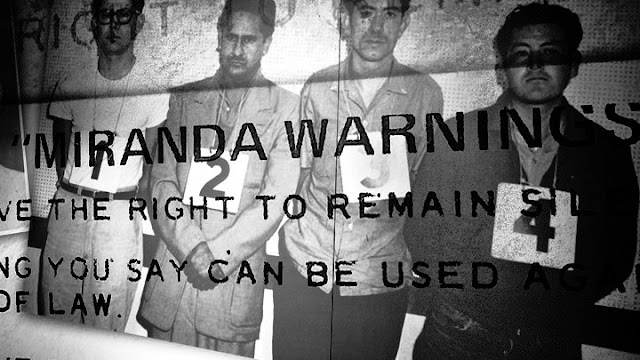Miranda warning

"Miranda Warning" or Miranda Rights arose from a case (Miranda v. Arizona) where Miranda was convicted after he confessed to robbery, kidnapping and rape during interrogation but was later overturned because of the harsh way the investigation was allegedly conducted. This gave rise to the requirement that all criminal suspects be informed of their rights.
With the enactment of RA 7438, police officers face 10 years or more of imprisonment if they fail to read the Miranda Rights to the person being arrested. RA 7438 is an act defining certain rights of person arrested, detained or under custodial investigation as well as the duties of the arresting, detaining and investigating officers, and providing penalties for violations thereof.
SOURCE: Bartolome (2016). OPINION: Miranda warning. Tin Bartolome. Aug 25 2016 11:07 PM. https://news.abs-cbn.com/blogs/opinions/08/25/16/opinion-miranda-warning.
Article III, Section 12, paragraph 1 of the Constitution provides:
Any person under investigation for the commission of an offense shall have the right to be informed of his right to remain silent and to have competent and independent counsel preferably of his own choice. If the person cannot afford the services of counsel, he must be provided with one. These rights cannot be waived except in writing and in the presence of counsel.The above provision in the fundamental Charter embodies what jurisprudence has termed as "Miranda rights" stemming from the landmark decision of the United States Supreme Court, Miranda v. Arizona. It has been the linchpin of the modern Bill of Rights, and the ultimate refuge of individuals against the coercive power of the State.The Miranda doctrine requires that: (a) any person under custodial investigation has the right to remain silent; (b) anything he says can and will be used against him in a court of law; (c) he has the right to talk to an attorney before being questioned and to have his counsel present when being questioned; and (d) if he cannot afford an attorney, one will be provided before any questioning if he so desires.
In the Philippines, the right to counsel espoused in the Miranda doctrine was based on the leading case of People v. Galit and Morales, Jr. v. Enrile, rulings subsequently incorporated into the present Constitution. The Miranda doctrine under the 1987 Charter took on a modified form where the right to counsel was specifically qualified to mean competent and independent counsel preferably of the suspect's own choice. Waiver of the right to counsel likewise provided for stricter requirements compared to its American counterpart; it must be done in writing, and in the presence of counsel.
Verily, it may be observed that the Philippine law on custodial investigation has evolved to provide for more stringent standards than what was originally laid out in Miranda v. Arizona. The purpose of the constitutional limitations on police interrogation as the process shifts from the investigatory to the accusatory seems to be to accord even the lowliest and most despicable criminal suspects a measure of dignity and respect. The main focus is the suspect, and the underlying mission of custodial investigation – to elicit a confession. (People v. Mojello. G.R. No. 145566. March 9, 2004)



